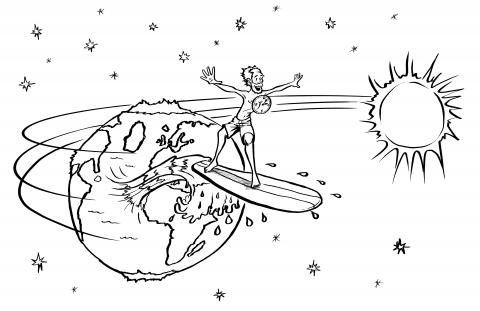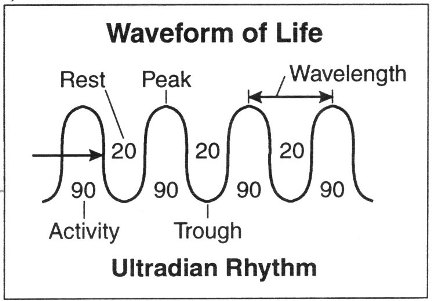
The last article was entitled: “Giving yourself the time to find your direction”. The question of time is fundamental in discovering one’s values. When we’re so taken by the rat race, the fantasy of having a time where everything stops can be alluring. Have you ever had the feeling that you are so rushed in your life that you dream of the weekend, the next vacation, or even retirement. I have had a few clients who have confessed that they have secretly wished to be sick enough to be admitted into the hospital so that they could finally get some much needed rest. If you have the fantasy of getting out of the rat race, don't let those wandering thoughts be, its an alarm that something is off balance in your life.
Last month, I was invited to be a guest speaker at an event held by the University of Street Café. The University of Street Café is part of an initiative by Concordia University to hold public conversations in local places on a variety of different topics. The topic I was invited to introduce was entitled: Seeking Down-Time: Have we forgotten how to rest?
Below are my reflections to the question: Have we forgotten how to rest?
From a biological perspective, Life occurs in cycles. The earth turns around the sun 365 days a year. Within the year we travel around the sun, we have seasons, tides, as well as, breeding and menstrual cycles to name a few. The earth also turns around its axis on a 24-hour cycle. Within 24 hours we have night/day cycles. We have coined the term circadian rhythms to describe how our bodies respond to the night/day cycle by being asleep or awake. Circadian comes from the Latin Circa Dies which means about a day. In between the 1950-70’s it was discovered that even within these binary cycles, there were predictable patterns within them. These patterns were broadly called ultradian rhythms, which signify that they occur many times during the day. For example, it was discovered that sleep cycles occur around a 90 to 120-minute cycle and it involves 5 stages of sleep. Throughout the night while you sleep, you go from light sleep to deep sleep and then you dream, and on you go through out the night. In the 1970s, Peretz Lavie, a psychophysiologist discovered that these 90 to 120-minute cycles also occur during the day. We feel focused, energized for a period of time, and then we feel fatigued, lacking attention, and all of this happens on a predictable timeline. It is the body’s continuous way of re-establishing equilibrium or bringing it back into a state of homeostasis.
One of the main reasons for this is that the brain has a master clock. This clock synchronizes with the sun to create these circadian cycles. Curiously, research has shown that your stomach, liver and all vital organs also have built-in clocks.
According to Dr. David Agus, who became famous as Steve Jobs’ oncologist and author of the Lucky Years: How to Thrive in the Brave New World of Health wrote that it is a good thing to be a bit obsessional about a routine. Maintaining such a routine reduces stress on the body. Our bodies love rhythms, patterns, and predictability. He reasoned that if you want to be healthier, there is much to be said about having a predictable routine. Have you ever noticed with a stable routine; you tend to wake up every day around the same time without the need of an alarm clock. You also generally get tired at the same time each day. We feel the need to go to the bathroom and desire for food at predictable times. By keeping a stable routine, your body learns to predict what is coming next and prepares itself. Remember the salivating dogs to Pavlov’s bell prior to even seeing food. When life is predictable, the body doesn't need to sound the stress alarm and is prepared for what comes next.
What to do with all these waves? One option is to ride them as Dr. Agus suggested. Keep track of your routine so that you can adopt a regular one on a daily basis. Dr. Ernest Rossi went further in his book: The Twenty-Minute Break: Reduce Stress, Maximize Performance, Improve Health and Emotional Well-Being Using the New Science of Ultradian Rhythms. He suggested in his book that you should keep track when you feel mentally and physically alert and when you feel tired and absent-minded. He calls these two states: “Ultradian Peak performance” and “Ultradian Stress Syndrome.” He suggested instead of drinking a cup of coffee or any other stimulants in order to override the trout of the Ultradian stress syndrome wave, to use the time and take a 20-minute break. Take a few deep breaths, practicing relaxation technique or take a leisure walk. Smokers have the right idea but the wrong behavior. No one at work thinks that a smoker’s break is problematic, then why do we look down when we talk about having a break without a cigarette. Instead of staying busy and stimulated, go inwards and learn to relax. By going with the flow on the trout of the wave, Dr. Rossi argued that you are combating the Ultradian Stress Syndrome with a healing response. You are riding the wave instead of fighting it. According to Dr. Rossi, after a while getting consciously in synch to your body’s rhythms, you will become even more productive, vital, and creative.I don’t know about you, but listening to my own rhythms is difficult because like you, I am very busy and I don’t have time for all this. As we say in the western world, “time is money” and “I will sleep when I am dead.” Psychologically, stress is nature’s signal that we are getting too high on our stress hormones (cortisol, adrenaline) and we need to take a healing break. When this break is put off, it easily becomes the proverbial light at the end of the tunnel. When we lose hope that we will ever get out of the tunnel, stress related illnesses are not too far away.
Dr. Rossi believes that we pay a high price for not listening to our body’s rhythms. He believes the Ultradian Stress Response is the cause of much dis-ease in our society. Psychologically and socially, it is not hard to see that we have lost our way. We’re going through a psychological and social crisis, even with the advent of new psychopharmacology, we found that depressive episodes are increasing, and occurring at a younger age. Actually all psychological disorders are increasing and the same is happening for personality disorders (which is a psychological term for persistent difficulties in interpersonal relationships). For example, when we compare college students in the 1960 to their cohort today, there is a 68% rise in diagnoses.
So we cannot say that biology is the sole factor for these changes, as our bodies haven’t really changed over the last 60 years. Psychosocial factors are the major reasons for this increase. That are many reasons for the increase but one reason that has been presented is due to our over exposure to media. It used to be during the Vietnam War that it was not allowed to have pictures of dead soldiers on the newspaper. Today, a child is exposed to traumatic events on a regular basis simply by watching YouTube. Death, murder and everything else under the sun are easily accessible with a few clicks. Life is much more stimulating: television, cell phones, videogames, sensational news, all compete for our attention. Reflecting and going inwards becomes more difficult. In the western world, as a Balinese friend once told me: “We see time as money,” they consider, “time as a rubber band”. The CNESST, which is the organization that takes care of workers' compensation in Quebec, are in the process of considering accepting what we often call burnouts as a work-related accident. Companies are restructuring in order to do more with less. Workers end up doing twice the amount of work, and often bringing it home with the help of their company paid cell phones. For those who have kids, I often hear how parents are overwhelmed trying to reconcile family and work. The pace of life has increased tremendously and the more frantic we become, the less and less we are able to slow down. Like a friend who runs a company once told me, if you don’t keep up, you’ll get left behind. The problem is that by constantly focusing outside of ourselves, we lose the ability to listen to our bodies. At the extreme end, this vigilant external focus is what a stress response looks like.
So here we are… The most tragic story of our current society is that we have forgotten the natural rhythm of the world, and lost the felt sense in ourselves. We drink coffee and energy drinks to fill in the trout of our bio-rhythmic waves. We take drugs and alcohol to come down and force a relaxation response. We cling to the vacation ahead or some other oasis in our living desert. We work day and night with the help of the glowing screen in order to simply keep up. We rationalize all of it as normal because everyone else is doing it. At what price, and to what purpose?
Zen Master Huihai Dazhu Huihai was asked by a Vinaya master, "When one seeks to follow the Way, is there a particular manner in which he should behave?"
"There is," Dazhu said.
"Please tell me about it," the Vinaya master requested.
"When one is hungry, one eats; when one is tired, one sleeps."
"But everyone does that," the Vinaya master complained. "Your behavior isn't different from that of commoners."
"They're not the same at all," Dazhu said.
"In what way are they different?"
"When most people eat, they don't just eat; their mind are preoccupied with a thousand different fantasies. When they sleep, they don't just sleep; their minds are filled with any number of idle thoughts."

Add new comment